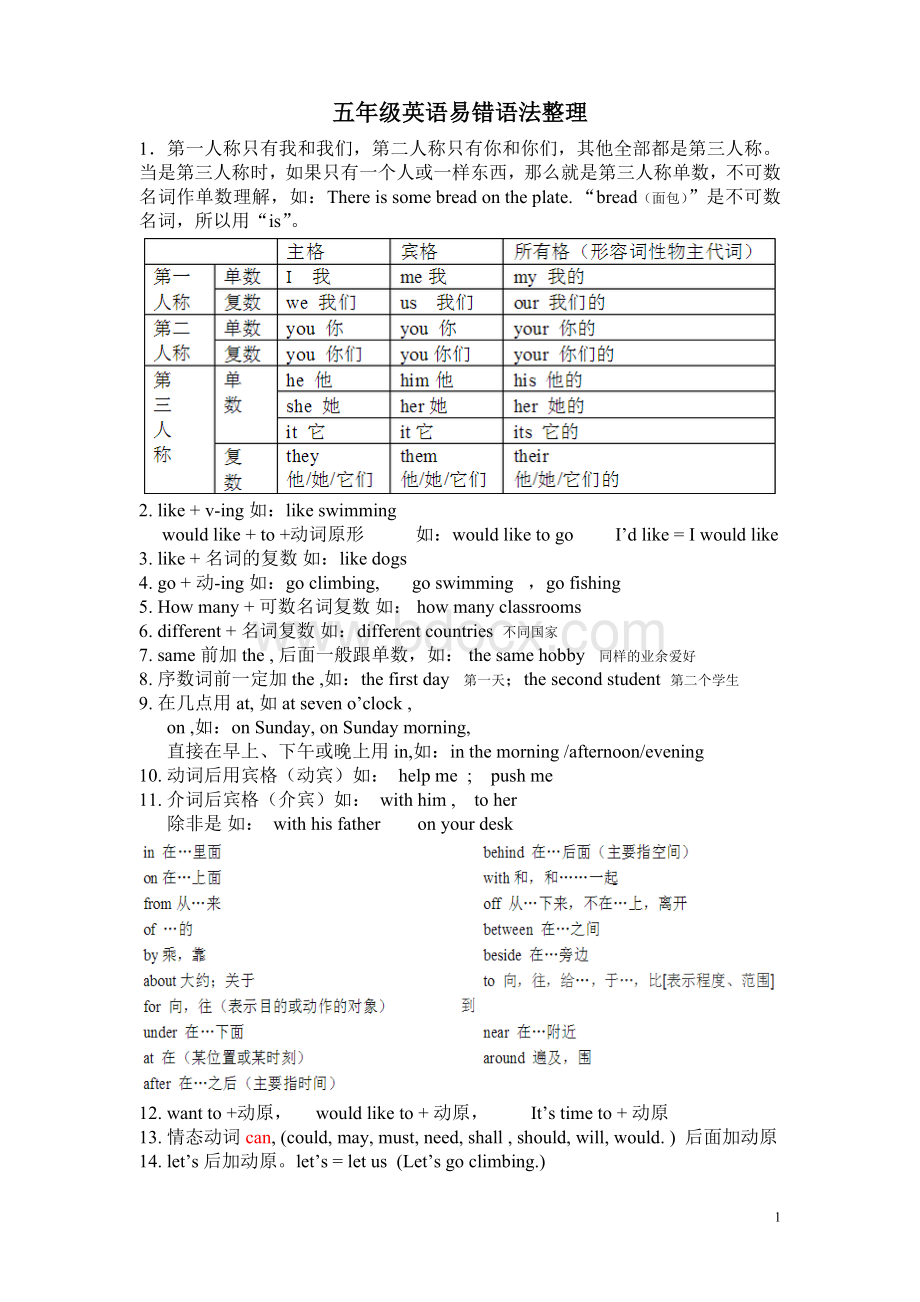译林五年级英语易错语法整理Word下载.doc
《译林五年级英语易错语法整理Word下载.doc》由会员分享,可在线阅读,更多相关《译林五年级英语易错语法整理Word下载.doc(3页珍藏版)》请在冰豆网上搜索。

How
many
可数名词复数
how
classrooms
6.
different
名词复数
countries不同国家
7.
same
前加the
后面一般跟单数,如:
hobby
同样的业余爱好
8.
序数词前一定加the
如:
first
day
第一天;
thesecondstudent第二个学生
9.
在几点用
at,
如
at
seven
o’clock
Sunday,
Sunday
morning,
直接在早上、下午或晚上用in,如:
in
morning
/afternoon/evening
10.
动词后用宾格(动宾)如:
help
me
;
pushme
11.
介词后宾格(介宾)如:
with
him
to
her
除非是
his
father
on
your
desk
12.
want
+动原,
动原,
It’s
time
动原
13.
情态动词can,
(could,
may,
must,
need,
shall
should,
will,
would.
)后面加动原
14.
let’s
后加动原。
let
us
(Let’sgoclimbing.)
15.
祈使句中动词用原形,否定句在句首加Don’t
Open
door,
please.
à
Don’t
open
16.
助动词(do,
does,
don’t,
doesn’t)后动词用原形
17.
some用于肯定句,any用于否定句。
陈述句改成疑问句和否定句时,some变成any.
除非是表示一种请求或希望得到肯定回答时
Can
you
get
fruit?
Could
help
do
washing?
Shall
we
buy
toys?
Would
please
give
pens?
18.
There
be
结构就近原则
is
a
teacher
and
students
classroom.
19.
常见不可数名:
water,
coffee,
tea,
milk,
juice,
bread,
rice,
food,
fruit,
chicken(鸡肉),
fish(鱼肉),
chocolate(表示巧克力的时候)
20.
apple
tree,
tiger
mask,
picture
book,
flower
stamp这类短语变复数,前面一个词不变,后面一个变复数。
tree
trees;
mask
masks;
stamp
stamps
book
books
21.
表示一个什么的时候,元音字母开头的用an.
an
apple,
English
lesson,anartroom
22.
名词变复数,除了以下情况,一般都是加s
1).
以“
s.
x,
z,
th,
ch,
sh”结尾的,加“es”;
buses,glasses
2).
以o结尾的,如果没有生命加s,
如果有生命的加es.
photos,
potatoes(土豆),
tomato(西红柿)
3).
以“y”结尾的,如果“y”前面是辅音字母,去“y”加“ies”,除了元音字母“a,
e,
i,
o,
u”,其他都是辅音字母;
library
libraries,
story
stories,
toy
toys,
monkey
monkeys
4).
以“f,
fe”结尾的把“f,
fe”变成“ves”.
5).
不规则变化:
child
children,
woman
women,
man
men,
foot
feet,
tooth
teeth,
mouse
mice
6).
单复数同形:
sheep,fish(鱼),
Chinese(中国人),
Japanese(日本人),
deer(鹿)
23.
乐器前加the,
球类前不加the,
(play
乐器,play
球类)如:
play
piano,
football
24.
for
sth.
或
如:
breakfast.=
have
breakfast.
25.
在句首或表示星期,学科,国家,语言的单词,首字母大写。
26.
一般疑问句:
由be动词(am,
is,
are),
情态动词(can,
could,
would)
及助动词(do,
does)引导的疑问句。
改一般疑问句方法如下:
a.先找be动词:
am,
are。
找到后放到句首,其余照抄,注意句号变问号,I和we变成you;
me和us变成you;
my和our变成your;
some变成any。
He
hungry.
Is
hehungry?
b.
找不到be动词再找情态动词:
can,(
would)找到后放到句首,如:
Helen
can
swim
fast.
fast?
c.
既没有be动词也没有情态动词,则在句首添加助动词,三单加does,别的加do,其余照抄。
注意句号变问号,动词变原形,如:
Mike
plays
well.
Does
well?
27.
回答一般疑问句时要注意与引导词对应。
Is
he
interesting?
Yes,
is.
/
No,
isn’t.
Yes,
she
can.
can’t.
does.
doesn’t.
28.
改否定句:
参照一般疑问句改法。
注意some变any
a.
先找be动词:
are,找到后在后面加not,其余照抄
are
flowers.
not
any
(are
not=aren’t,
not=isn’t,
am
not没有缩写)
b.找不到be动词再找情态动词,找到后在后面加not,其余照抄
jump
high.
(can
not=cannot=can’t)
既没有be动词也没有情态动词,则在动词前面加助动词,三单加doesn’t,别的加don’t,其余照抄,注意加了之后动词要变原形。
His
uncle
has
aparrot.
doesn’t
haveaparrot.
likedancing.
don’tlikedancing.
29.
对划线部分提问,即改特殊疑问句。
先找到合适的疑问词来替代划线部分,放在句子最前面,然后参照一般疑问句改法。
一样的去找be动词和情态动词,有的就加在疑问词后面,没有的在疑问词后面加助动词,其余照抄,注意事项和一般疑问句一样。
3